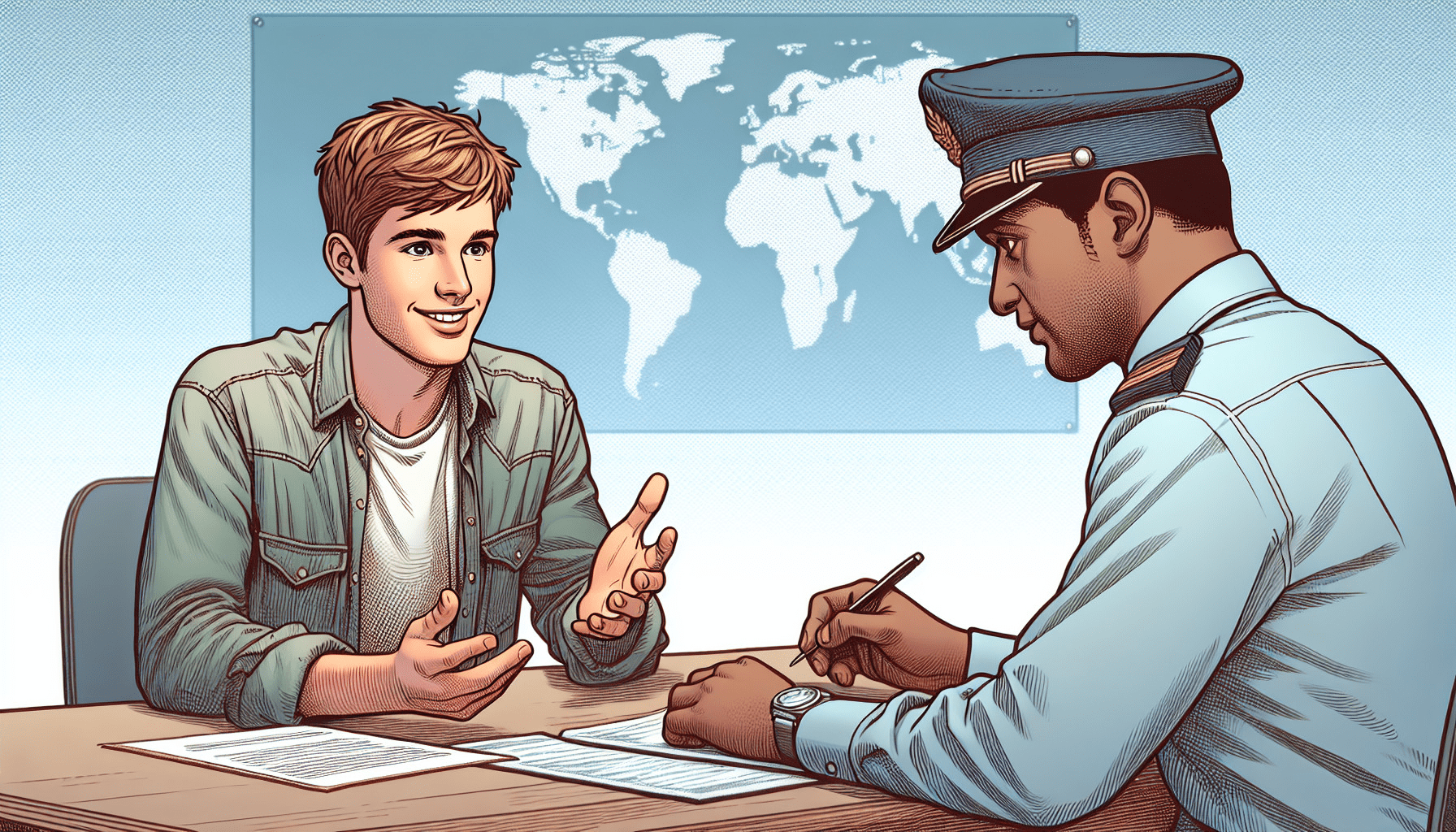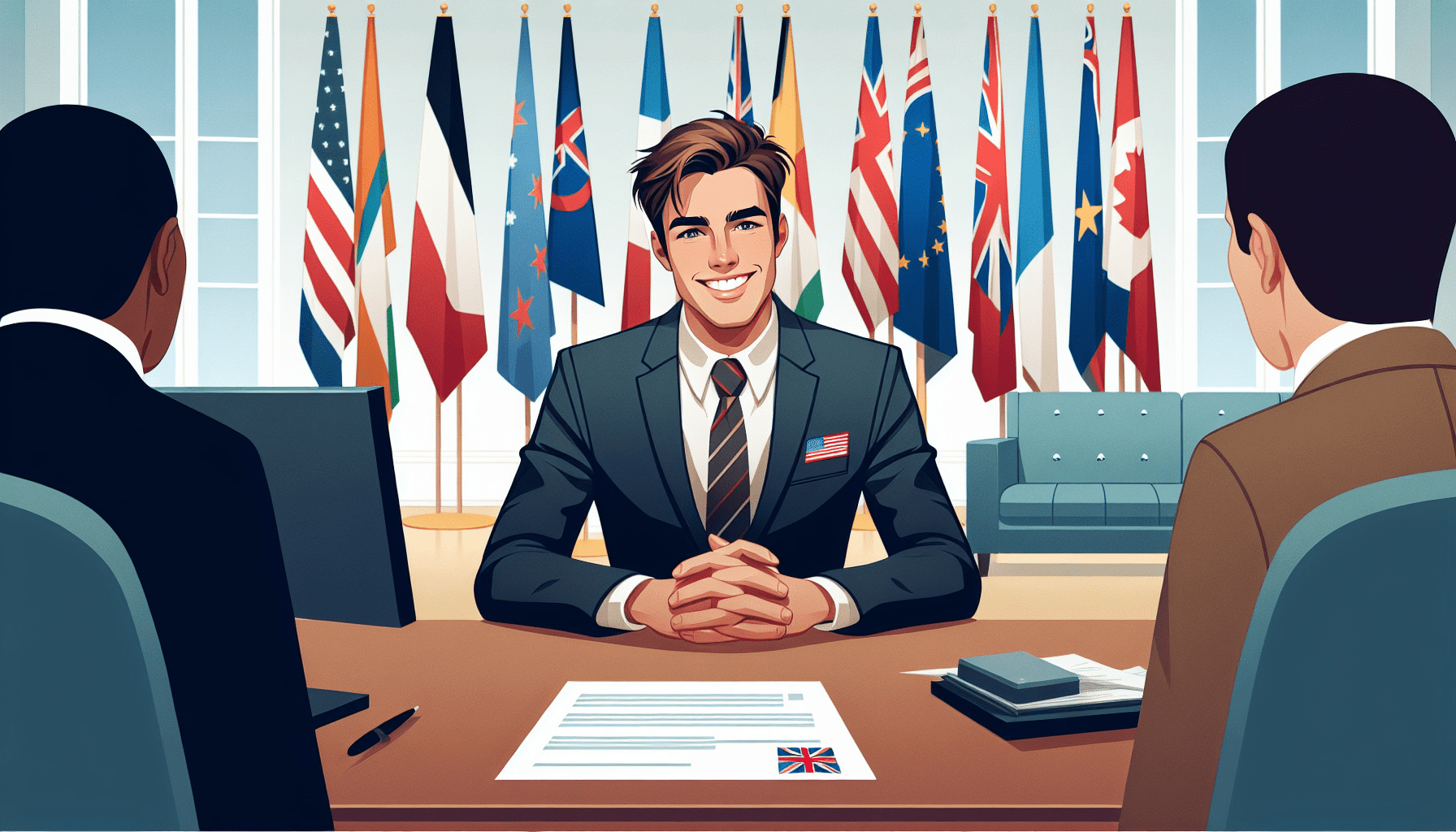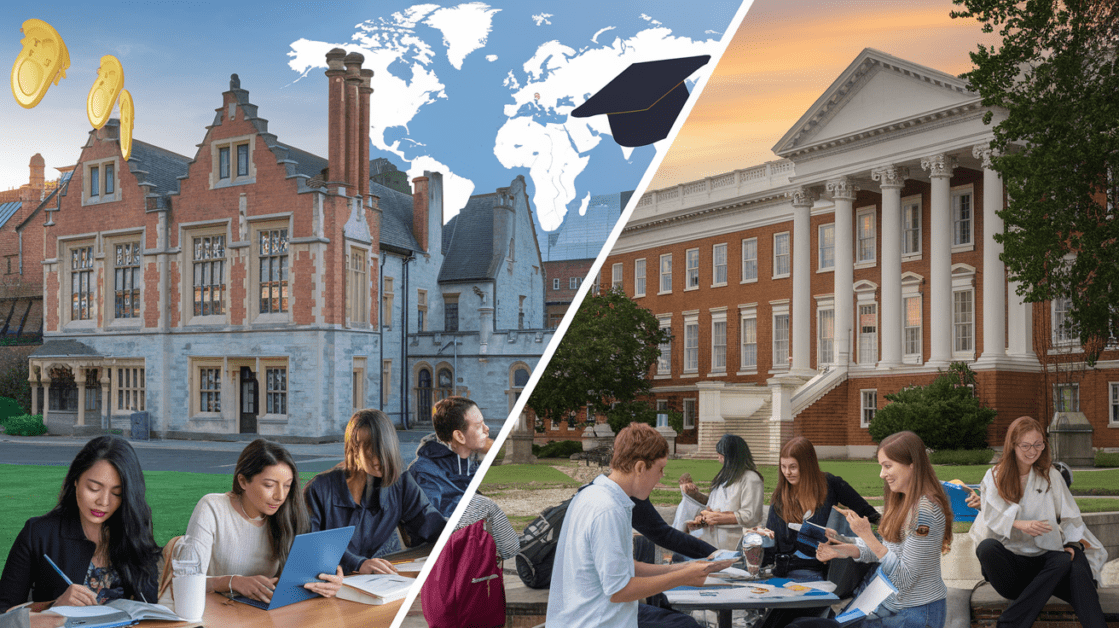
🌎 Are you dreaming of international adventures or new opportunities abroad in 2024? Your visa interview might be the only thing standing between you and your goals. But don’t let anxiety take over—preparation is your passport to success!
Imagine walking into the interview room with confidence, armed with the knowledge to tackle any question thrown your way. From making a stellar first impression to navigating tricky situations, we’ve got you covered. In this guide, we’ll unveil the secrets to acing your visa interview, including up-to-date considerations for 2024 applicants.
Ready to turn your visa dreams into reality? Let’s dive into essential tips, common questions, and expert strategies that will help you sail through your interview with flying colors. Whether you’re a first-time applicant or looking to refine your approach, our comprehensive breakdown will ensure you’re fully prepared for this crucial step in your journey. 🌟
Table of Contents
Preparing for Your Visa Interview

A. Gathering essential documents
Before your visa interview, it’s crucial to have all necessary documents organized and readily available. Create a comprehensive checklist to ensure you don’t miss any vital paperwork. Here’s a table of essential documents you should prepare:
Document Type | Description | Importance |
|---|---|---|
Passport | Valid for at least 6 months beyond your intended stay | Critical |
DS-160 confirmation | Proof of completed online visa application | Mandatory |
Appointment letter | Confirmation of your scheduled interview | Required |
Photograph | Recent passport-sized photo meeting specifications | Necessary |
Financial documents | Bank statements, sponsorship letters, etc. | Crucial |
Educational records | Transcripts, diplomas, test scores (e.g., TOEFL, IELTS) | Essential |
B. Practicing common interview scenarios
To boost your confidence and improve your responses, engage in mock interviews with friends or family. Focus on:
Clear and concise answers
Maintaining eye contact
Proper body language
Handling unexpected questions
C. Understanding the interview process
Familiarize yourself with the visa interview process to reduce anxiety and increase preparedness. Typically, the process involves:
Security screening
Document verification
Fingerprinting
Face-to-face interview with a consular officer
Remember, interviews are often brief, lasting only a few minutes. Be prepared to articulate your purpose for travel and plans concisely.
D. Researching visa requirements
Each visa category has specific requirements. Thoroughly research the requirements for your particular visa type. Key areas to focus on include:
Eligibility criteria
Purpose of travel
Intent to return to your home country
Financial capabilities
Ties to your home country
Understanding these requirements will help you address potential concerns proactively during the interview.
Now that you’ve gathered your documents, practiced scenarios, understood the process, and researched requirements, you’re well-prepared for the next crucial step: making a strong first impression during your visa interview.
Mastering the Art of First Impressions

Now that you’ve prepared for your visa interview, it’s crucial to focus on making a strong first impression. This can significantly impact the outcome of your interview and set a positive tone for the entire process.
Demonstrating confidence and politeness
Confidence is key in a visa interview, but it must be balanced with politeness. Here are some tips to help you strike the right balance:
Maintain good eye contact with the interviewer
Speak clearly and at a moderate pace
Use respectful language and address the interviewer formally
Show enthusiasm for your plans without appearing overly eager
Remember, your body language speaks volumes. Stand or sit up straight, avoid fidgeting, and offer a firm handshake if appropriate in the cultural context.
Arriving on time and prepared
Punctuality is crucial for creating a positive first impression. Being late can start your interview on the wrong foot and may even result in a rescheduling. Consider the following:
Preparation Step | Recommendation |
|---|---|
Plan your route | Research the location and transportation options in advance |
Arrival time | Aim to arrive 15-30 minutes early |
Documents | Organize all required documents in a neat folder |
Practice run | Consider visiting the location a day before if possible |
Being well-prepared also means having all necessary documents readily accessible. This demonstrates your organization skills and respect for the interviewer’s time.
Dressing appropriately for the interview
Your appearance plays a significant role in creating a positive first impression. While there’s no strict dress code for visa interviews, it’s best to err on the side of formality. Consider these guidelines:
Opt for business casual or formal attire
Choose clean, well-pressed clothing
Avoid flashy jewelry or excessive accessories
Ensure your shoes are clean and in good condition
Remember, different cultures may have varying standards of appropriate dress. Research the norms for the country you’re applying to and dress accordingly.
Creating a positive first impression goes beyond just these points. It’s about presenting yourself as a responsible, trustworthy individual who will respect the laws and customs of the country you wish to visit. By mastering these elements, you’ll set a strong foundation for a successful visa interview.
As we move forward, we’ll delve into how to effectively answer common visa interview questions, equipping you with the knowledge to navigate the core of the interview process confidently.
Answering Common Visa Interview Questions

Now that you’ve made a great first impression, let’s dive into handling some of the most common visa interview questions you’re likely to encounter in 2024. Being well-prepared for these questions can significantly increase your chances of a successful visa application.
A. Handling questions about previous visa applications
When asked about your visa history, honesty is crucial. Be prepared to discuss:
Previous visa applications (approved or denied)
Reasons for any past denials
Changes in circumstances since previous applications
Remember, consistency is key. Ensure your answers align with your application and supporting documents.
B. Clarifying your travel itinerary
Interviewers often inquire about your travel plans to assess the legitimacy of your visit. Be ready to provide:
Detailed information about your planned activities
Specific dates of travel
Accommodation arrangements
Itinerary Element | Details to Prepare |
|---|---|
Dates | Precise arrival and departure dates |
Accommodation | Hotel bookings or host information |
Activities | List of places to visit or events to attend |
Transportation | Inter-city travel plans |
C. Addressing financial stability concerns
Visa officers need to ensure you can support yourself during your stay. Be prepared to discuss:
Your current employment status and income
Savings and financial assets
Sponsorships or scholarships (if applicable)
Estimated expenses for your trip
Bring relevant financial documents to support your claims.
D. Discussing your ties to your home country
To demonstrate your intention to return home after your visit, be ready to talk about:
Your current job or studies in your home country
Family responsibilities
Property ownership
Future plans or commitments in your home country
E. Explaining the purpose of your visit
Clearly articulate the primary reason for your trip. This could include:
Tourism: Highlight specific attractions or events you plan to visit
Business: Discuss meetings, conferences, or potential collaborations
Education: Explain your study program and why you chose that particular institution
Family visit: Provide details about your relationship with the person you’re visiting
Remember to:
Keep your answers concise and relevant
Maintain eye contact and speak confidently
Provide additional information only when asked
Be consistent with the information in your application
By preparing thoroughly for these common visa interview questions, you’ll be well-equipped to navigate your 2024 visa interview with confidence. Next, we’ll explore how to handle more challenging interview situations that may arise during your visa application process.
Navigating Tricky Interview Situations

As you progress through your visa interview, you may encounter some challenging situations. Being prepared to handle these scenarios can significantly increase your chances of a successful outcome. Let’s explore how to address some common tricky situations you might face during your visa interview.
Addressing gaps in employment or education
Gaps in your employment or education history can raise concerns for visa officers. Here’s how to address them effectively:
Be honest and upfront about any gaps
Provide a clear explanation for the gap
Highlight any productive activities during that time
Emphasize your current goals and future plans
For example, if you took a year off between studies, explain how you used that time for personal growth, volunteering, or skill development. Always frame your explanation positively, showing how the experience has contributed to your overall growth and preparedness for your upcoming endeavor.
Responding to unexpected questions
Visa officers may ask questions that catch you off guard. Here are some strategies to handle unexpected queries:
Take a moment to gather your thoughts
Ask for clarification if needed
Answer honestly and concisely
Relate your answer back to your visa purpose if possible
Remember, it’s okay to pause briefly before answering. This shows that you’re thoughtful and considerate in your responses.
Dealing with language barriers
If English isn’t your first language, you might face some communication challenges during the interview. Here’s how to navigate language barriers:
Strategy | Description |
|---|---|
Practice beforehand | Rehearse common interview questions in English |
Speak slowly and clearly | Enunciate your words and maintain a steady pace |
Ask for repetition | If you don’t understand a question, politely ask for it to be repeated |
Use simple language | Avoid complex vocabulary; focus on clear communication |
Nonverbal communication | Maintain eye contact and use appropriate gestures to support your words |
If you’re really struggling, it’s acceptable to ask if an interpreter is available. However, try your best to communicate in English as this demonstrates your language proficiency, which is often a key factor in visa approvals.
Remember, visa officers understand that English may not be your first language. They’re more interested in your honest responses and your ability to communicate effectively, rather than perfect grammar or pronunciation.
By preparing for these tricky situations, you’ll feel more confident and composed during your visa interview. This preparation, combined with honesty and clarity in your responses, will significantly improve your chances of a successful visa application. As we move forward, we’ll explore some specific considerations for visa interviews in 2024, including any new regulations or focus areas that may affect your application process.
2024-Specific Visa Interview Considerations

As we move forward in our discussion on visa interviews, it’s crucial to address the unique considerations that applicants in 2024 may face. The global landscape has evolved significantly, and visa officers are likely to have specific concerns and expectations for this year’s applicants.
Demonstrating Awareness of Current Global Events
In 2024, visa officers will expect applicants to be well-informed about current global affairs. This awareness demonstrates your engagement with the world and your ability to adapt to changing circumstances.
Stay updated on major international news
Understand how global events might affect your travel or study plans
Be prepared to discuss the current situation in your home country and destination country
Understanding New Visa Policies and Restrictions
Visa policies and restrictions are constantly evolving, and 2024 is no exception. It’s crucial to be aware of any changes that may affect your application or travel plans.
Policy Area | Potential Changes to Consider |
|---|---|
Entry Requirements | New health certifications or vaccinations |
Visa Duration | Adjusted lengths of stay for certain visa types |
Work Permissions | Changes in rules for part-time work during studies |
Financial Requirements | Updated proof of funds thresholds |
Addressing Post-Pandemic Travel Concerns
While the acute phase of the COVID-19 pandemic has passed, its effects on international travel and study continue to resonate. Visa officers may have specific questions or concerns related to post-pandemic travel.
Health and Safety Measures:
Be prepared to discuss your understanding of health protocols in your destination country
Demonstrate knowledge of any required quarantine procedures or testing requirements
Flexibility and Adaptability:
Explain your backup plans in case of unexpected travel disruptions
Discuss your ability to adapt to potential shifts between in-person and online learning
Long-Term Plans:
Be ready to articulate how your plans align with the evolving global situation
Discuss how your chosen program or travel purpose remains relevant in the post-pandemic world
By addressing these 2024-specific considerations, you’ll show the visa officer that you’re a well-prepared and responsible applicant. This awareness and preparation will significantly enhance your chances of a successful visa interview outcome. Next, we’ll explore some final tips to ensure your visa interview is a success.
Tips for a Successful Visa Interview

Following up appropriately after the interview
After your visa interview, it’s crucial to follow up professionally. Send a polite email thanking the interviewer for their time and reiterating your interest in obtaining the visa. If you were asked to provide additional documents, ensure you submit them promptly. Keep track of your application status through the official channels provided by the embassy or consulate.
Maintaining positive body language
During your visa interview, your non-verbal communication is just as important as what you say. Maintain good posture, make appropriate eye contact, and offer a confident handshake if culturally appropriate. Avoid fidgeting or crossing your arms, as these can be perceived as signs of nervousness or defensiveness. A genuine smile can help create a positive atmosphere.
Providing honest and consistent answers
Consistency is key in visa interviews. Ensure that your answers align with the information provided in your application documents. Be truthful in all your responses, as discrepancies can lead to visa denial. If you’re unsure about a question, it’s better to ask for clarification rather than providing inaccurate information.
Speaking clearly and concisely
Articulate your responses clearly and concisely. Avoid rambling or providing unnecessary details. Practice speaking at a moderate pace to ensure the interviewer can understand you easily. If English isn’t your first language, consider practicing with a native speaker beforehand to improve your clarity and confidence.
To help you prepare for your visa interview, here’s a checklist of essential tips:
Research common visa interview questions
Prepare concise answers to potential questions
Gather all necessary documents
Dress professionally
Arrive early to the interview location
Stay calm and composed throughout the interview
Here’s a comparison of effective and ineffective communication strategies during a visa interview:
Effective Strategies | Ineffective Strategies |
|---|---|
Providing clear, concise answers | Rambling or giving vague responses |
Maintaining eye contact | Avoiding eye contact or staring excessively |
Speaking confidently | Speaking too softly or hesitantly |
Showing genuine interest | Appearing disinterested or bored |
Being honest about your intentions | Providing inconsistent or false information |
By following these tips and strategies, you’ll be well-prepared for your 2024 visa interview. Remember, the key to success lies in thorough preparation, honest communication, and maintaining a positive demeanor throughout the process. With the right approach, you can significantly increase your chances of a successful visa application outcome.
Now that you’re equipped with these essential tips for a successful visa interview, you’ll be better prepared to navigate the process with confidence and clarity.
Conclusion

Navigating a visa interview can be a challenging yet crucial step in realizing international travel or relocation plans. By thoroughly preparing, understanding common questions, and staying informed about current visa policies, applicants can significantly increase their chances of success. The key to a successful interview lies in presenting oneself confidently, honestly, and professionally while clearly articulating the purpose and intentions of the visit.
As visa regulations and global circumstances continue to evolve, it’s essential for 2024 applicants to stay updated on the latest requirements and potential changes in the interview process. By following the tips outlined in this guide and approaching the interview with a well-prepared mindset, applicants can face their visa interview with confidence and optimism. Remember, the visa officer’s primary goal is to ensure the applicant’s intentions align with the visa category they’re applying for, so focus on clearly communicating your plans and demonstrating your ties to your home country.
FAQ - Frequently Asked Question
1. What are the most common questions asked in a visa interview?
Answer: Common questions include inquiries about your purpose for traveling, details about your study or work program, your financial situation, and your ties to your home country. Questions may also explore your knowledge of the country you are visiting and your post-study plans.
2. How should I prepare for my visa interview?
Answer: Preparation involves reviewing potential interview questions, organizing your documents, understanding the details of your study or work program, and being able to clearly explain your intentions and plans. It’s also helpful to practice speaking confidently and concisely.
3. What documents should I bring to the visa interview?
Answer: Essential documents include your passport, visa application form, passport-sized photos, proof of financial support, acceptance letter from the educational institution or employer, proof of ties to your home country, and any other documents specified by the consulate or embassy.
4. How important is it to demonstrate ties to my home country?
Answer: Demonstrating strong ties to your home country is crucial, as it shows the visa officer that you have reasons to return after your visit. These ties can include family connections, a job, property ownership, or ongoing educational commitments.
5. What should I do if I don’t understand a question during the interview?
Answer: If you don’t understand a question, it’s okay to politely ask the visa officer to repeat or rephrase it. It’s better to seek clarification than to provide an inaccurate answer.
6. What are some common mistakes to avoid during the visa interview?
Answer: Common mistakes include giving inconsistent answers, providing false information, appearing nervous or unprepared, and failing to present all required documents. It’s also important to avoid arguing with the visa officer.

